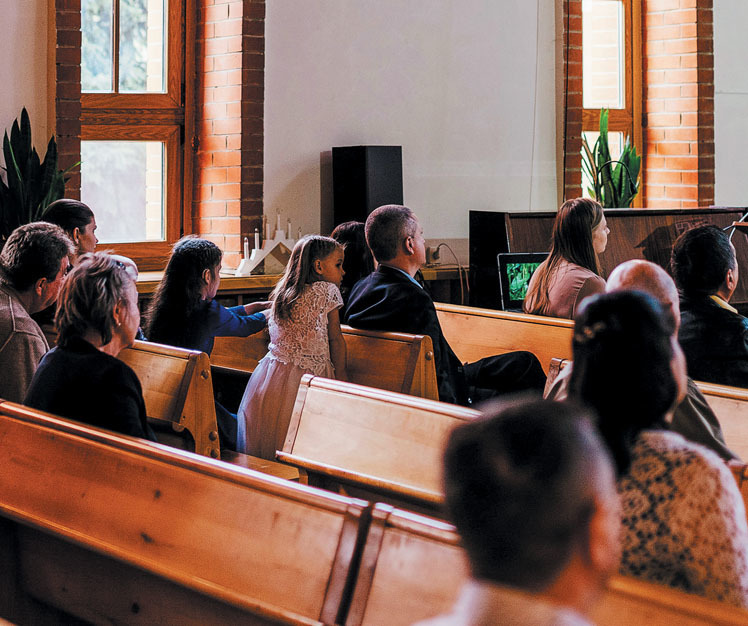Actual attendance actually matters

→en français
Growing up I went to church whenever the church doors opened. Twice on Sunday, once on Wednesday and Friday for youth group. Sometimes I even went to church when the doors were locked! (Our family took a turn on the church cleaning schedule.)
I also remember the saying, “Going to church doesn’t make you a Christian any more than going to a garage makes you a car.” For years, I repeated that tidbit of supposed gospel wisdom.
Except that it’s not entirely true.
Clearly, church attendance is not and never will be a means of salvation.
However, in making this point, we may have inadvertently overlooked how church attendance helps form us as Christians, even if it has never been the cause of becoming a Christian. The Holy Spirit is the ultimate cause of spiritual rebirth, but the Spirit can and does use church attendance as a means of sanctification or growth in holiness.
Recently I asked Rick Hiemstra, the EFC’s director of the Centre for Research on Church and Faith, what years of EFC’s research reveals as the most important indicator of a growing and vital Christian faith. Personal prayer and Bible reading are vital, but the top predictor of growth in the faith is . . . regular church attendance.
True, some habitually attend church, but barely act like Christians the rest of the week, proving unregenerate persons attend church too. But for those seeking faithful growth, regular church attendance is more than mere habit or ritual, but an important means of being shaped ever more into the likeness of Christ.
The top predictor of growth in the faith is . . . regular church attendance.

Regular church attendance isn’t a single practice, as if catching a Sunday morning bus is the sum total of going to church. Rather it is a complex matrix of theological and spiritual practices we engage in every time we join with Christ’s Body.
Think about it. Going to church requires an intentional act of leaving home in anticipation of hearing from God’s Word. It’s praying and hearing others pray, even if we’ve neglected to do so in days prior. It’s physically and collectively receiving the sacraments or ordinances, those mysterious special means of sanctifying grace where God ministers to, heals and encourages us, while also hearing His call to confess our sins and reconcile broken relationships.
Church is also a place where we fellowship with other believers, serve one another, give and yes, encourage and exhort one another. It may only be an hour a week, whether in a church building or a home, but it’s an hour that may be more important than we could have ever imagined.
Even more fundamentally, going to church is a way to walk against the grain of society. A way to do something different from what everyone else is doing. Sure, we can worship God at the golf course, garden or grocery store, but how does that bear witness to our priorities any differently than the multitude of others in those same places? Going to church is therefore at least one way in which we publicly demonstrate the countercultural nature of our faith – that there is something more important than perpetually attending to the cares, pleasures and idols of this world.
Going to church, in other words, means uniting to demonstrate our common devotion to none other than Father, Son and Spirit, the ultimate source of every good thing we have (James 1:17). It’s why even in the most difficult places in the world, Christians risk their lives to gather with fellow believers.
The pandemic taught us vital ways to stay connected to the Body of Christ when physically it was difficult or impossible to do. Today, we’re grateful for the technologies helping people stay connected even when unable to join in corporate worship due to illness, isolation, unavoidable family or work demands, or even traumas people have experienced at church. However, for all the good virtual church might give, let’s not forget the host of spiritual benefits lost if we simply choose not to go to church when we are able.
The author of Hebrews unlikely anticipated the virtual church. Thank God we have it when needed! But I also suspect he would still insist, “Let us not give up the habit of meeting together, as some are doing. Instead, let us encourage one another all the more, since you see that the Day of the Lord is coming nearer” (Hebrews 10:25 GNT).
In other words, “Keep going to church.” And if you’ve stopped this is as good a week as any to start going again.
David Guretzki is the EFC’s president and CEO. Read more of these columns at FaithToday.ca/CrossConnections. Photo of congregation: Natalya Ukolova